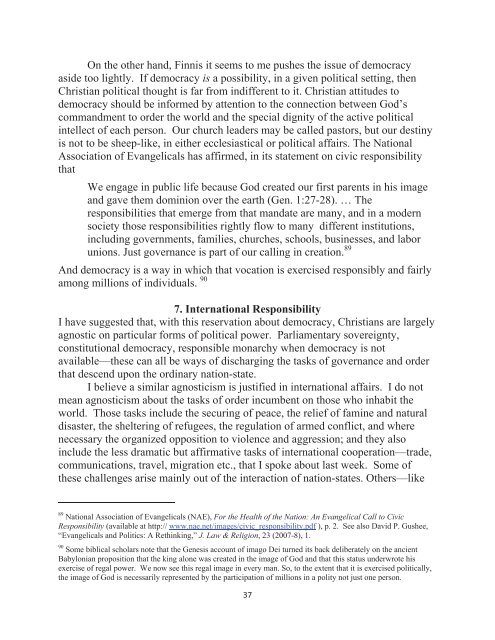International Legal Evangelism: Intelligence, Reconnaissance & Missions
International Legal Evangelism: Intelligence, Reconnaissance & Missions
International Legal Evangelism: Intelligence, Reconnaissance & Missions
Create successful ePaper yourself
Turn your PDF publications into a flip-book with our unique Google optimized e-Paper software.
On the other hand, Finnis it seems to me pushes the issue of democracy<br />
aside too lightly. If democracy is a possibility, in a given political setting, then<br />
Christian political thought is far from indifferent to it. Christian attitudes to<br />
democracy should be informed by attention to the connection between God’s<br />
commandment to order the world and the special dignity of the active political<br />
intellect of each person. Our church leaders may be called pastors, but our destiny<br />
is not to be sheep-like, in either ecclesiastical or political affairs. The National<br />
Association of Evangelicals has affirmed, in its statement on civic responsibility<br />
that<br />
We engage in public life because God created our first parents in his image<br />
and gave them dominion over the earth (Gen. 1:27-28). … The<br />
responsibilities that emerge from that mandate are many, and in a modern<br />
society those responsibilities rightly flow to many different institutions,<br />
including governments, families, churches, schools, businesses, and labor<br />
unions. Just governance is part of our calling in creation. 89<br />
And democracy is a way in which that vocation is exercised responsibly and fairly<br />
among millions of individuals. 90<br />
7. <strong>International</strong> Responsibility<br />
I have suggested that, with this reservation about democracy, Christians are largely<br />
agnostic on particular forms of political power. Parliamentary sovereignty,<br />
constitutional democracy, responsible monarchy when democracy is not<br />
available—these can all be ways of discharging the tasks of governance and order<br />
that descend upon the ordinary nation-state.<br />
I believe a similar agnosticism is justified in international affairs. I do not<br />
mean agnosticism about the tasks of order incumbent on those who inhabit the<br />
world. Those tasks include the securing of peace, the relief of famine and natural<br />
disaster, the sheltering of refugees, the regulation of armed conflict, and where<br />
necessary the organized opposition to violence and aggression; and they also<br />
include the less dramatic but affirmative tasks of international cooperation—trade,<br />
communications, travel, migration etc., that I spoke about last week. Some of<br />
these challenges arise mainly out of the interaction of nation-states. Others—like<br />
<br />
89 National Association of Evangelicals (NAE), For the Health of the Nation: An Evangelical Call to Civic<br />
Responsibility (available at http:// www.nae.net/images/civic_responsibility.pdf ), p. 2. See also David P. Gushee,<br />
“Evangelicals and Politics: A Rethinking,” J. Law & Religion, 23 (2007-8), 1.<br />
90 Some biblical scholars note that the Genesis account of imago Dei turned its back deliberately on the ancient<br />
Babylonian proposition that the king alone was created in the image of God and that this status underwrote his<br />
exercise of regal power. We now see this regal image in every man. So, to the extent that it is exercised politically,<br />
the image of God is necessarily represented by the participation of millions in a polity not just one person.<br />
<br />
37

















